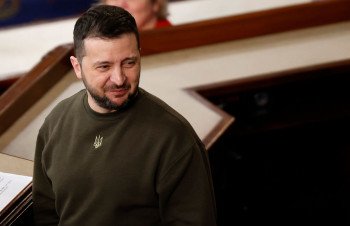ISW: Putin's Christmas ceasefire announcement likely campaign to damage Ukraine's reputation
Russian dictator Vladimir Putin’s announcement on Dec. 5 that Russian forces will conduct a 36-hour ceasefire along the entire front line in Ukraine is likely an information operation intended to damage Ukraine's reputation, the Institute for the Study of War said in its latest report.
Putin ordered Defense Minister Sergei Shoigu to implement a temporary ceasefire along the entire front line in Ukraine from midday on Jan. 6 to midnight on Jan. 7, according to Russian state media agency RIA Novosti, citing an official Kremlin press release.
Considering that Putin "cannot reasonably expect Ukraine to meet the terms of this suddenly declared ceasefire, (he) may have called for the ceasefire to frame Ukraine as unaccommodating and unwilling to take the necessary steps towards negotiations," the ISW wrote.
Ceasefires also take time to organize and implement, and if Putin were serious about the Jan. 6-7 ceasefire, it would not have been announced 24 hours in advance, according to the ISW.
Earlier on Jan. 5, Patriarch Kirill, leader of the Russian Orthodox Church and a fervent supporter of Russia's war in Ukraine, had called for a "Christmas Truce" inspired by the famous ceasefire on the Western Front on Dec. 24, 1914, so that Orthodox Christian soldiers on both sides "could visit church services on Christmas Eve and Christmas Day."
Putin’s announcement was ostensibly a response to Patriarch Kirill's statement, the ISW wrote in its assessment.
Both Ukrainian and Western officials, including U.S. President Joe Biden, immediately called out the hypocrisy of the ceasefire announcement, stressing that Russia had conducted attacks across Ukraine at military and civilian infrastructure on Dec. 25--when many Ukrainians celebrate Christmas--and New Year's, the ISW said.
On New Year's Eve, Russia attacked Ukraine with missiles, followed by an attack with 45 drones minutes after New Year's, killing one and injuring 28 civilians around the country, including three children.










